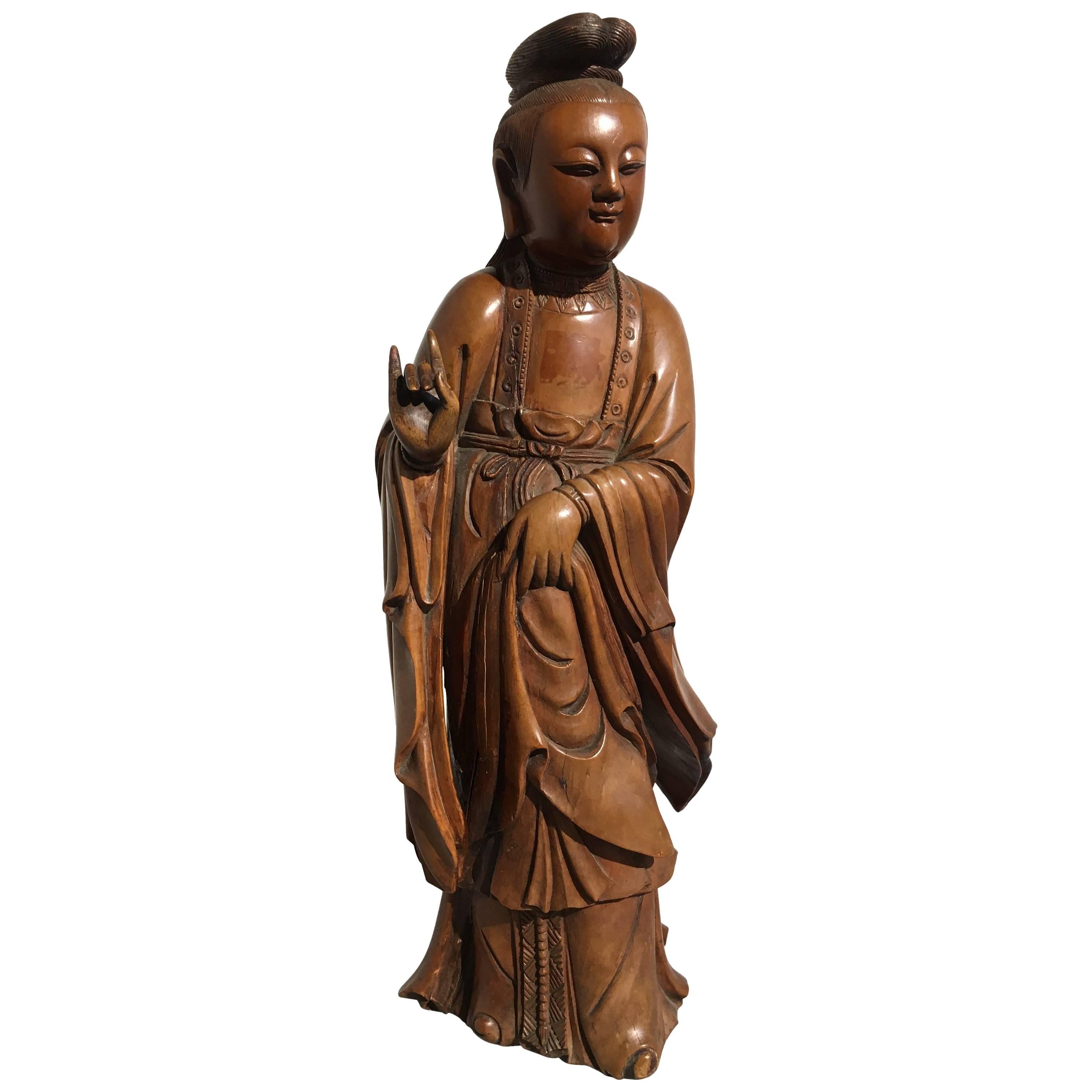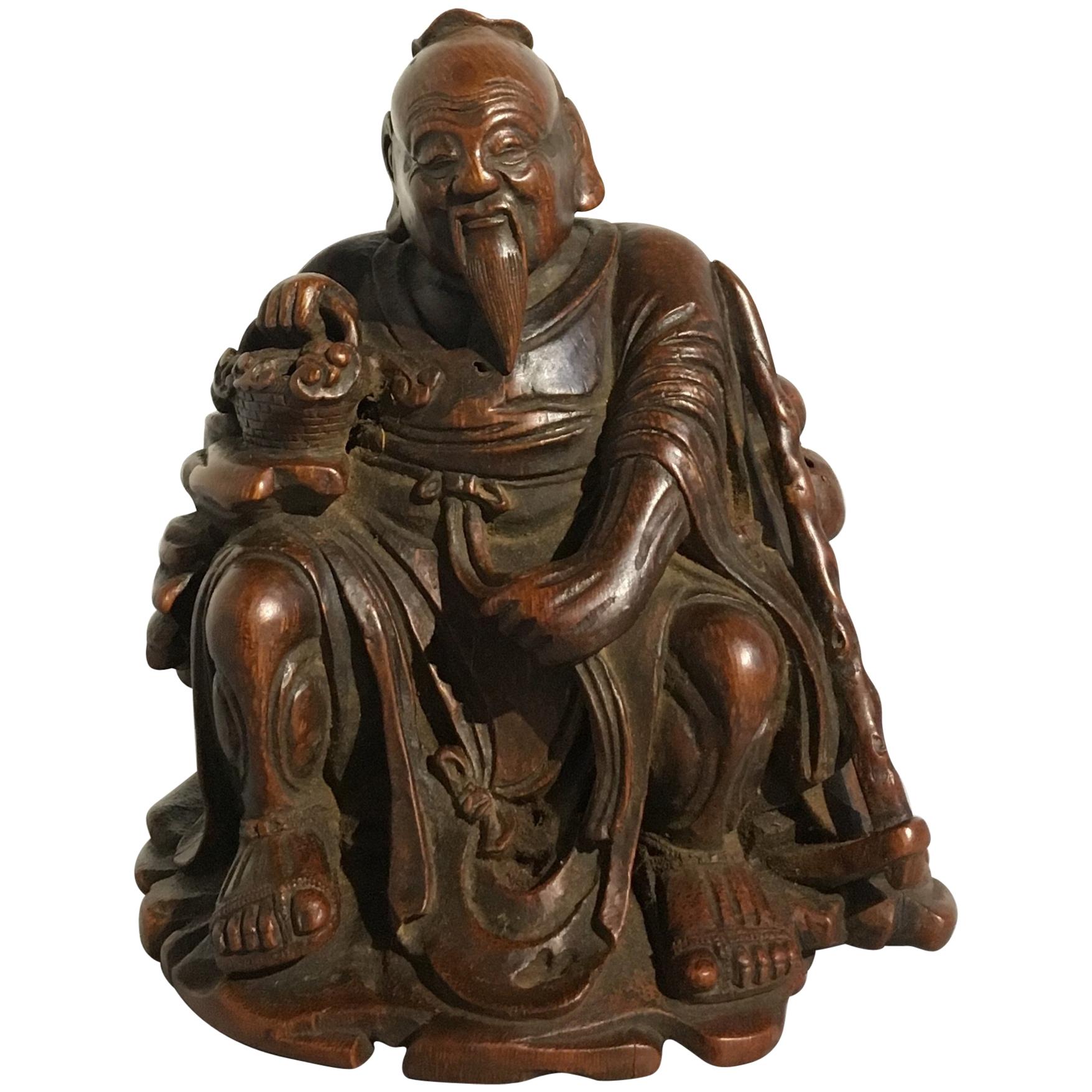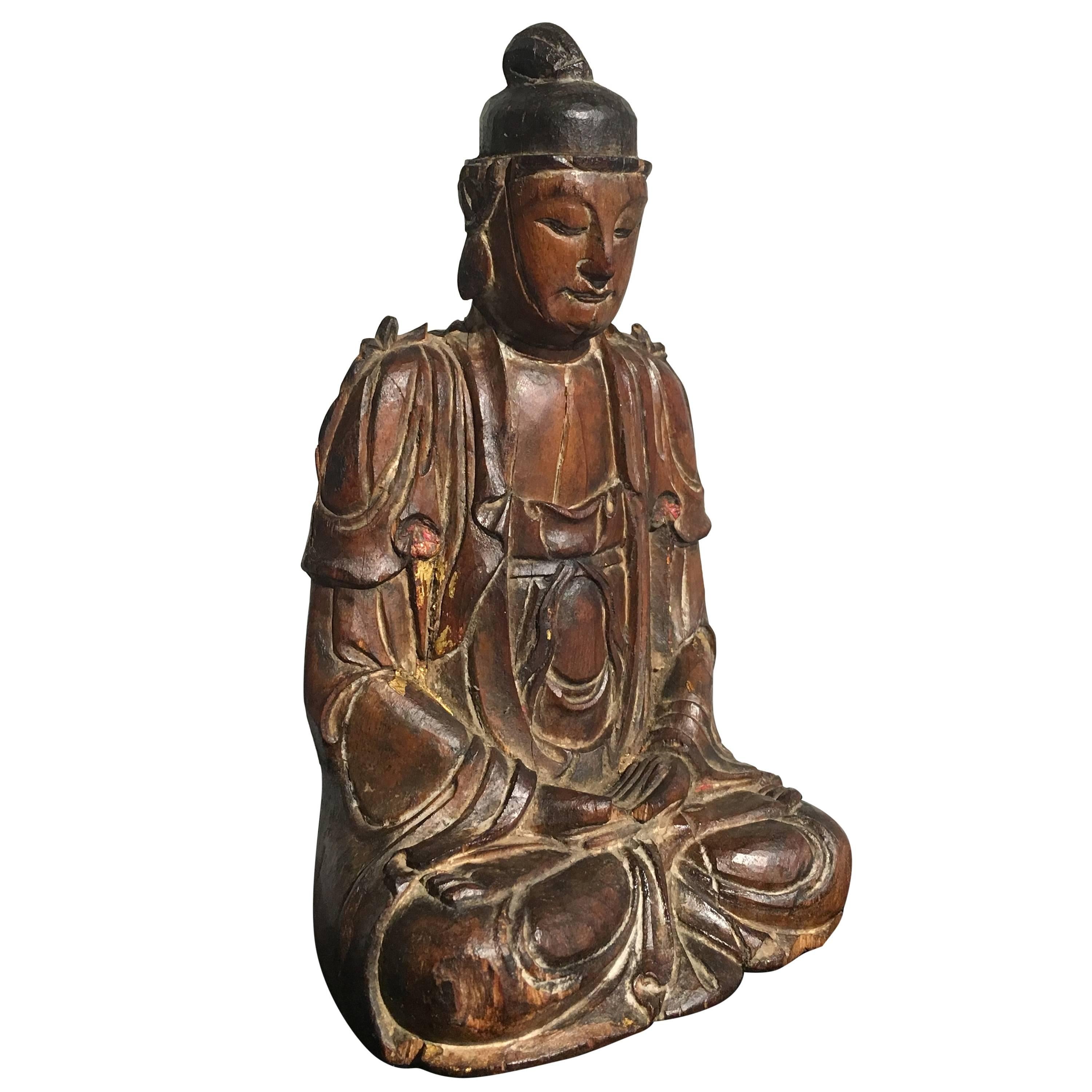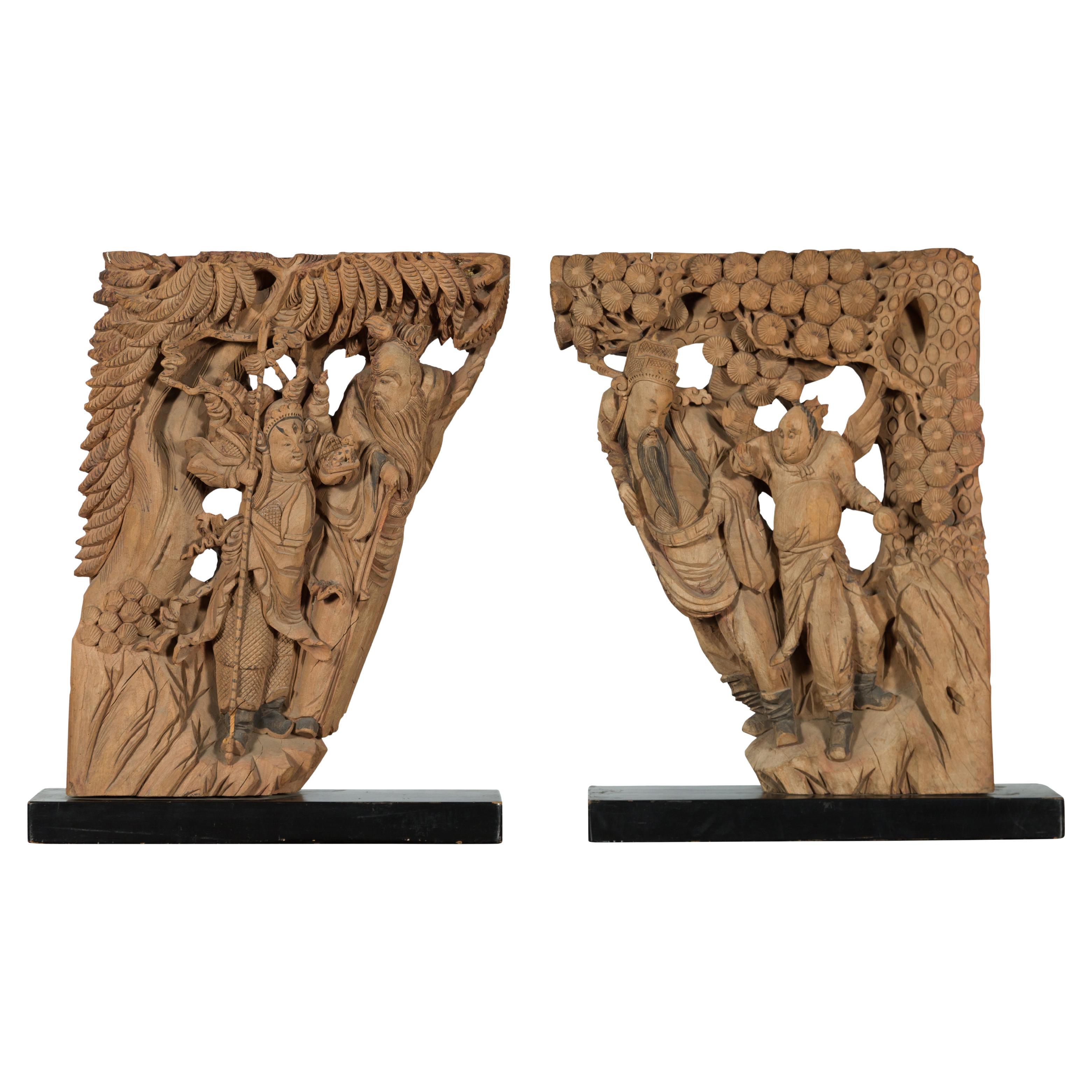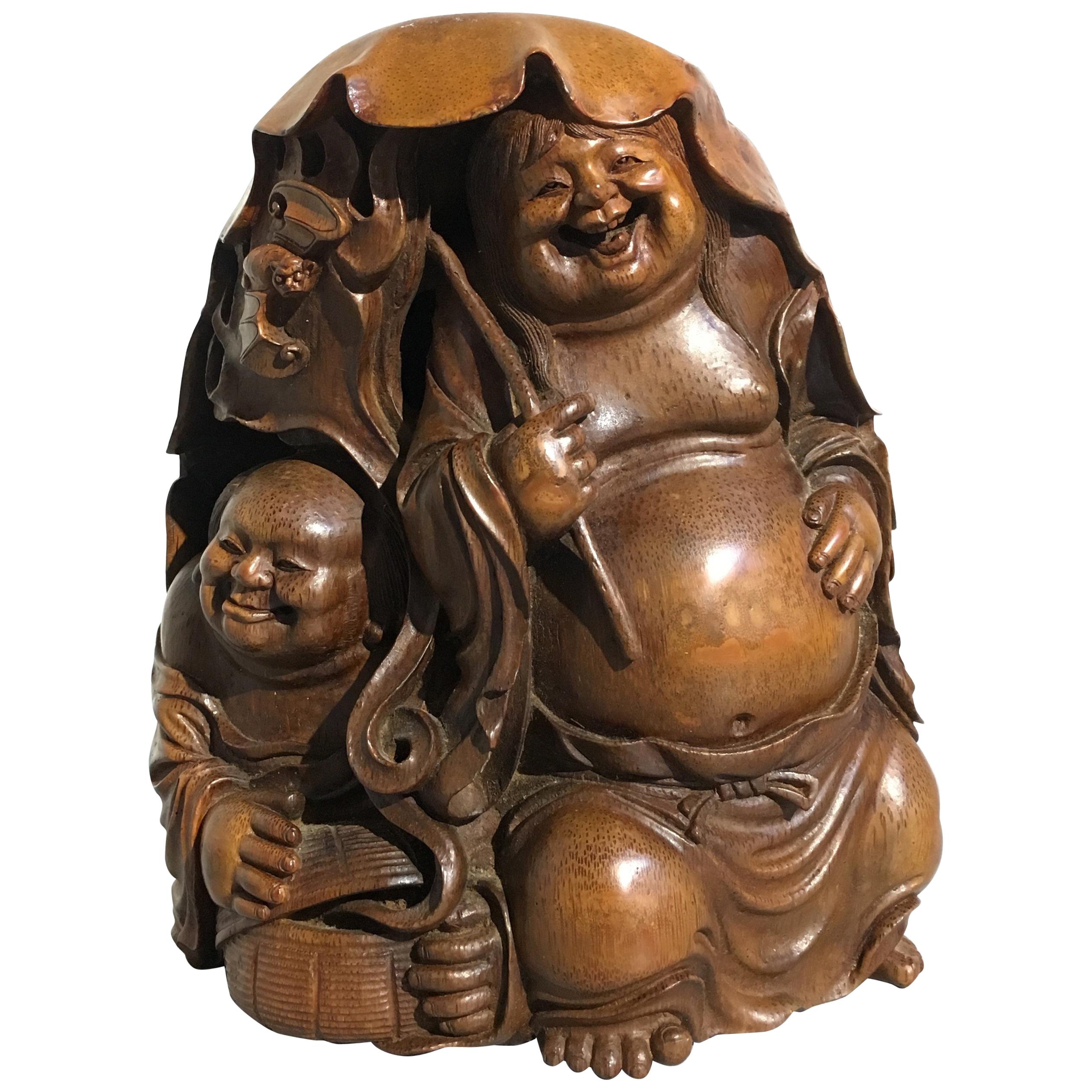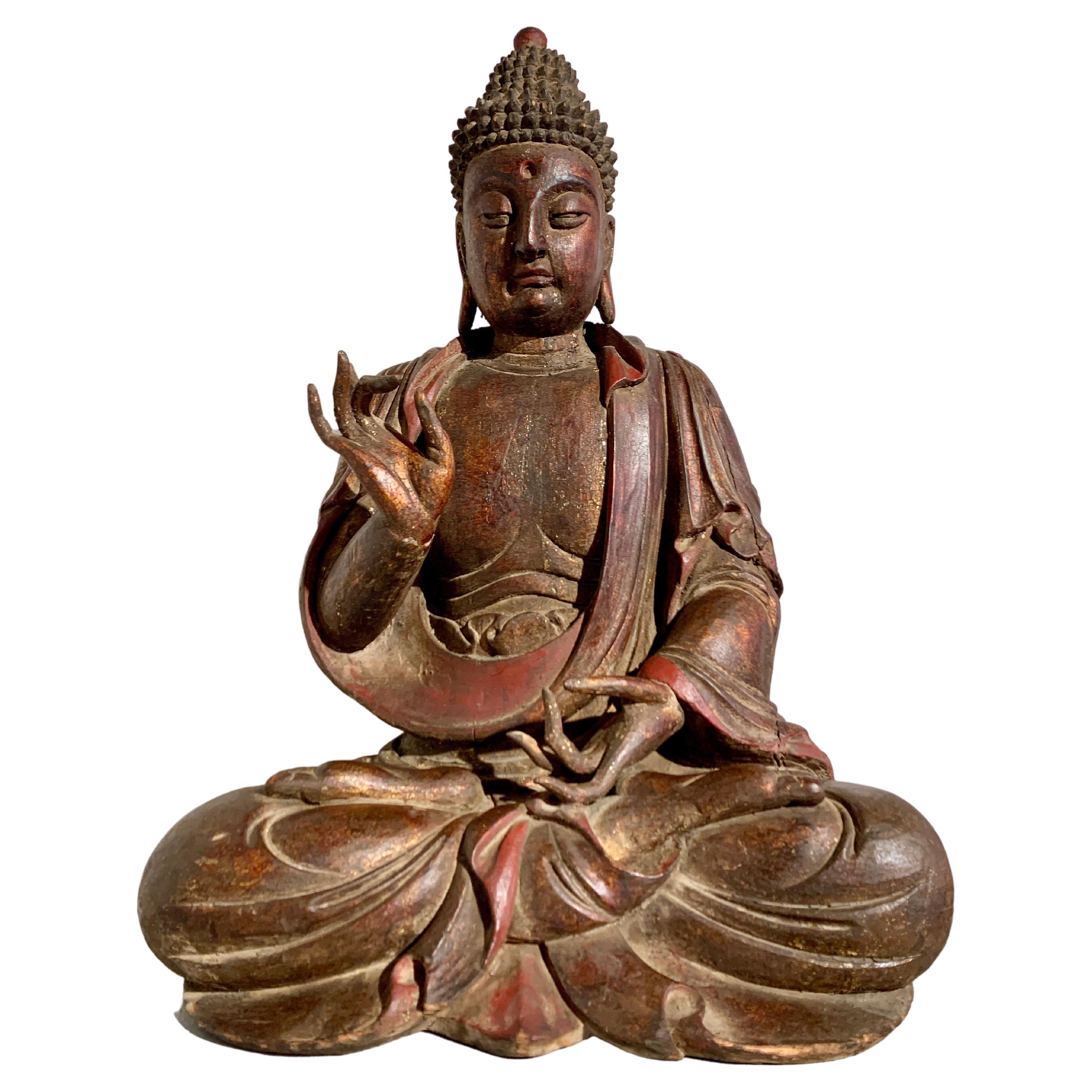Items Similar to Chinese Carved Zitan Figure of a Bodhisattva, Qing Dynasty
Want more images or videos?
Request additional images or videos from the seller
Chinese Carved Zitan Figure of a Bodhisattva, Qing Dynasty
About the Item
A finely carved Chinese zitan wood figure of an unidentified bodhisattva, possibly Guanyin, late Qing Dynasty, circa 1900, China.
The androgynous figure has a plump, almost matronly face, with downcast eyes and a gentle smile. The hair in long tresses, gathered and tied in a high chignon.
The enlightened being is portrayed seated in dhyanasana, bare feet resting on crossed legs, both soles pointing up.
Thick robes billow and drape around the full figured body. The hands display shuni mudra, often associated with Guanyin, with the thumb and middle finger forming a circle. Shuni mudra is the gesture of patience.
Traces of gilding remain on the face, hands and feet. The hair has been streaked with crushed lapis lazuli.
Carved from zitan, an extremely dense tropical hardwood. The specimen used for this figure is especially dark, and could easily be mistaken from bronze at first glance, with the weight to match. The wood displays the tell-tale "crab claw" marks, as well as the golden flecks that make zitan so appealing.
- Dimensions:Height: 8.13 in (20.66 cm)Width: 4.75 in (12.07 cm)Depth: 2.75 in (6.99 cm)
- Style:Qing (Of the Period)
- Materials and Techniques:
- Place of Origin:
- Period:
- Date of Manufacture:circa 1900
- Condition:Repaired: Tip of the raised index finger repaired. Wear consistent with age and use. Minor losses. Much of the gilding gone. Small loss to the pinky of the proper right hand. On the same hand, the tip of the index finger repaired.
- Seller Location:Austin, TX
- Reference Number:1stDibs: LU89475204403
About the Seller
5.0
Platinum Seller
These expertly vetted sellers are 1stDibs' most experienced sellers and are rated highest by our customers.
Established in 2001
1stDibs seller since 2010
307 sales on 1stDibs
Typical response time: 1 hour
- ShippingRetrieving quote...Ships From: Austin, TX
- Return PolicyA return for this item may be initiated within 7 days of delivery.
More From This SellerView All
- Chinese Carved Boxwood Figure of Guanyin, Mid-Qing DynastyLocated in Austin, TXA sublime Chinese carved boxwood figure of the Bodhisattva of Compassion, Avalokiteshvara, called Guanyin in Chinese, mid-Qing dynasty. The an...Category
Antique Late 18th Century Chinese Qing Sculptures and Carvings
MaterialsBoxwood
- Chinese Carved Bamboo Figure of a Sage, Qing Dynasty, 18th CenturyLocated in Austin, TXA sweet and lovely Chinese bamboo carving of the sage Dongfang Shuo, mid-Qing dynasty, 18th century, China. Well carved form a single section o...Category
Antique 19th Century Chinese Qing Sculptures and Carvings
MaterialsBamboo
- Small Song Dynasty Carved Wood Bodhisattva, 13th Century, ChinaLocated in Austin, TXA small and very fine Chinese carved sandalwood figure of a bodhisattva, possibly Avalokiteshvara (Guan Yin), Song Dynasty (960 to 1276), circa 13th ...Category
Antique 15th Century and Earlier Chinese Sculptures and Carvings
MaterialsHardwood
- Chinese Qing Dynasty Carved Bamboo HeHe ErXian Group, 19th CenturyLocated in Austin, TXA wonderful Chinese bamboo figural carving featuring the Taoist immortal twins of eternal youth, known as the HeHe ErXian, Qing dynasty, 19th century. F...Category
Antique 19th Century Chinese Qing Sculptures and Carvings
MaterialsBamboo
- Large Chinese Carved and Lacquered Buddha, Qing Dynasty, 19th CenturyLocated in Austin, TXA large and magnificent near life-sized Chinese carved and lacquered wood figure of a Buddha, Qing Dynasty, 19th century or earlier, southern China. The figure likely represents one of the Five Tathagatas, also known as Dhyani Buddhas or Wisdom Buddhas. More specifically, either Amitabha or Amoghasiddhi. Amitabha is the Buddha of infinite light, and represents the wisdom of observation and recognition. Amoghasiddhi is the Buddha of accomplishment, and represents the wisdom of perfected practices. The size and scale of the Buddha indicates it was made for temple worship. The large Buddha is portrayed seated in vajrasana, or full lotus position, with the soles of both feet facing up. His elegant hands, with impossibly long and slender fingers, perform shuni mudra, the gesture of bestowing patience. His right arm is bent at the elbow, the right hand raised to heart level. The left arm resting gently in his lap, the left hand at navel level. The Buddha is dressed in voluminous robes that wrap around his shoulders and body, and tied at the waist. The heavy fabric draping and pooling elegantly all around his robust body. His broad chest and right arm exposed. The Buddha's face is both solemn and beatific - his expression seeming to change depending on the angle of view. The most notable feature of his face is the large urna to the center of his forehead, set between a pair of painted, high arching brows over heavily lidded almond shaped eyes. A strong nose is set above a small mouth pursed in an ever so slight smile. Long pendulous earlobes touch his shoulders. The Buddha's hair arranged in the typical fashion, with "spikes" representing tight curls. A prominent ushnisha rises from the crown of his head, covered by more hair, and topped with a rounded protuberance. The Buddha is constructed from several blocks of wood, joined, carved and lacquered a deep red-brown with gold flecks...Category
Antique 19th Century Chinese Qing Sculptures and Carvings
MaterialsWood
- Chinese Carved Wood Bodhisattva Guanyin, Late Ming Dynasty, 17th CenturyLocated in Austin, TXAn attractive carved wood figure of the Bodhisattva Avalokiteshvara, known as Guanyin in China, late Ming Dynasty, early 17th century, China. Guanyi...Category
Antique Early 17th Century Chinese Ming Sculptures and Carvings
MaterialsGesso, Wood
You May Also Like
- Pair of 19th Century Chinese Qing Dynasty Hand-Carved Wooden Temple CorbelsLocated in Yonkers, NYA pair of Chinese Qing Dynasty period hand-carved temple corbels from the 19th century, mounted on black bases. Created in China during the Qing Dynasty...Category
Antique 19th Century Chinese Qing Figurative Sculptures
MaterialsWood
- Chinese Qing Dynasty Hand-Carved Wooden Temple Corbel with Detailed FiguresLocated in Yonkers, NYA Chinese Qing Dynasty period hand-carved wooden temple corbel from the 19th century with detailed figures and custom base. Created in China during the ...Category
Antique 19th Century Chinese Qing Mounted Objects
MaterialsWood
- Gilt Bronze Figure of Xi-Wang-Mu, Qing Dynasty, Qianlong KingdomLocated in Torino, ITThe queen mother of the west is cast in a seated position with her hands held before her chest holding a "gui". She is dressed in long-sleeved robes. Her face is framed by an elabora...Category
Antique 1790s Chinese Qing Sculptures and Carvings
MaterialsBronze
- Pair of Qing Dynasty Hand-Carved Wooden Temple Corbels with Deer MotifsLocated in Yonkers, NYA pair of Chinese Qing Dynasty hand-carved wooden temple corbels from the 18th or 19th century with deer and their young. Originally part of a temple wa...Category
Antique 18th Century Chinese Qing Animal Sculptures
MaterialsWood
- Chinese Qing Dynasty Period 19th Century Carved Head Sculpture of an OfficialLocated in Yonkers, NYA Chinese Qing dynasty period carved head sculpture from the 19th century, with headdress. Carved in China during the Qing dynasty, this sculptur...Category
Antique 19th Century Chinese Sculptures and Carvings
MaterialsStone
- Chinese Qing Turquoise Glazed Porcelain Seated Guanyin FigureLocated in Bishop's Stortford, HertfordshireA very fine and attractive Chinese Qing Dynasty turquoise glazed figure of Guanyin dating from the 19th Century or possibly earlier. The hollow biscuit porcelain figurine...Category
Antique 19th Century Chinese Qing Sculptures and Carvings
MaterialsPorcelain
Recently Viewed
View AllMore Ways To Browse
Carved A
Hand Display
Wood Figural
Carved Painted Figure
Wood Carving Figural
Antique High Hair
Middle Finger
Chinese Wood Figure
China Wood Figure
Chinese Painted Figure
Figure Dynasty
Gilding Chinese
Hand Carved Wood Cross
Chinese Hair
Hand And Thumb
Asian Wood Figure
Chinese Carved Gilt Wood
Antique Chinese Robes
